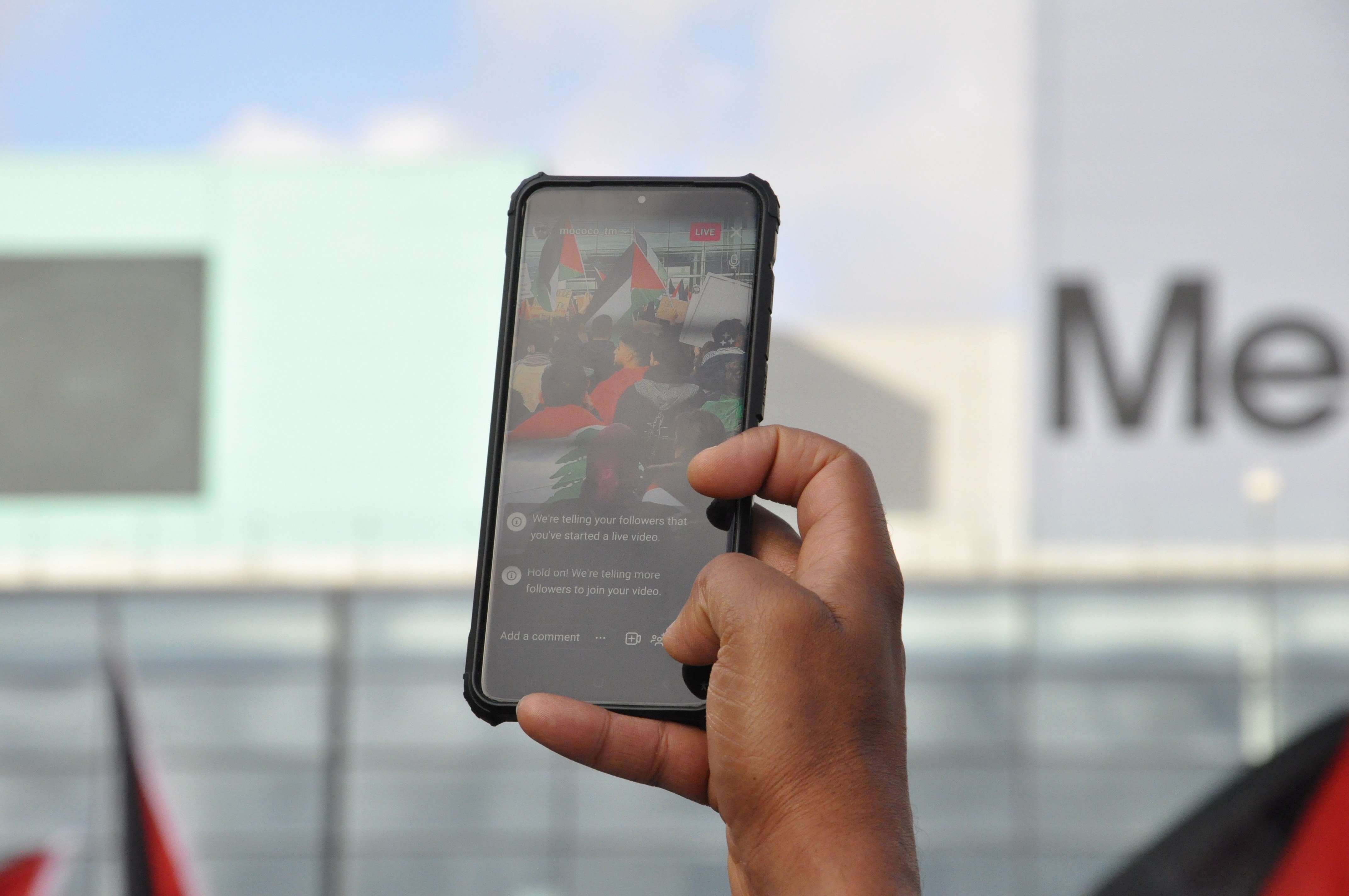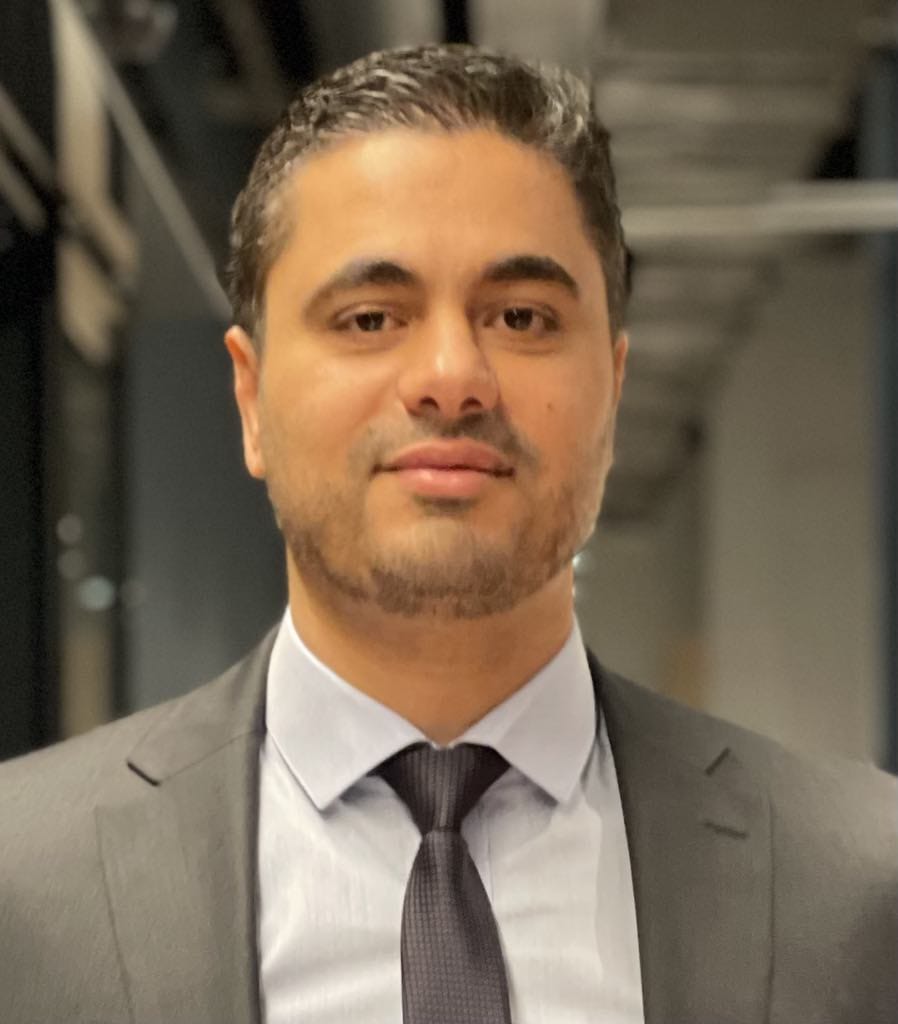رغم أننا قناة محلية مختصة فقط بالأحداث والتطورات في ليبيا فإن العدوان الإسرائيلي على قطاع غزة كان فوق أي أعراف أو قوانين في غرفة أخبار مؤسستنا. باتت تغطية الأخبار في فلسطين ملفا ثابتا في اجتماع التحرير اليومي. ننتج التقارير والأخبار ويتدخل في النشرات والتغطيات ضيوف من قطاع غزة وبقية فلسطين لتوضيح آخر المستجدات.
ولأننا -كبقية المؤسسات الإعلامية- نبث نشراتنا الإخبارية المباشرة على مواقع التواصل الاجتماعي، فقد تعرضنا لتضييق غير مسبوق: تنبيهات وتحذيرات وحذف للنشرات كليا في أوقات أخرى!
تحيز وعقوبات
في بداية الأمر كنا نظن أن عمليات الحظر قد تكون بسبب مشاهد دموية أفلتت من عين المنتج والمحرر، لكن حتى مع حرصنا على عدم عرض أي مشاهد عنيفة فلم تتوقف عمليات التضييق وباتت صفحتنا الرسمية والموثقة على فيسبوك معرضة للإغلاق.
ولأننا -كبقية المؤسسات الإعلامية- نبث نشراتنا الإخبارية المباشرة على مواقع التواصل الاجتماعي، فقد تعرضنا لتضييق غير مسبوق: تنبيهات وتحذيرات وحذف للنشرات كليا في أوقات أخرى!
ربما للوهلة الأولى شعرنا بالحيرة، ولكن مع الأيام اتضح لنا التوجه العالمي -الأمريكي والأوروبي خصوصا- لما يحدث في غزة وما يتعرض له الفلسطينيون من انتهاكات على يد الاحتلال الإسرائيلي، وهو توجه انعكس بشكل أكثر حدة على وسائل الإعلام ومواقع التواصل الاجتماعي. ويتجلى ذلك خصوصا في التحيز في نشر الأخبار والاعتماد فقط على الرواية الإسرائلية وتعطيل الجانب الآخر من القضية أو حتى إلغائه. وقد كان هذا هو هدف منصات التواصل الاجتماعي، وليس للأمر أي علاقة بالمعايير المهنية أو الاجتماعية والثقافية التي توصف بأنها مرجعية أخلاقية.
لست هنا للحديث عن هذا التوجه الذي بات واضحا للعيان ولا يحتاج لأي شرح، لكن ما يهمني الحديث عنه هو كيف أثر هذا التوجه على عملي بصفتي صحفيا وعلى عمل غرفة الأخبار كاملة.
حارس جديد
على مدار عقود كان تحديد الأجندة الإخبارية دائما ضمن مهام غرف الأخبار، وما يشغل بال الصحفيين هو القدرة على تمرير هذه الأجندات والملفات على ما يعرف بـــ"حارس البوابة" الذي يتمثل، في كثير من الأحيان، في الجهات الرقابية الحكومية. لكن مع اعتمادنا اليوم على التكنولوجيا في العصر الرقمي ظهر لنا -على الأقل في القضية الفلسطينية- "حارس بوابة" لا يقل صرامة عما سبقه، وهو ازدواجية معايير مواقع التواصل الاجتماعي. هذا الحارس الجديد جعلنا مضطرين إلى تخفيف المواد والمشاهد المنشورة والتقليل من العبارات والاتهامات المنددة بالعمليات العسكرية، بل بتنا نتوجس حتى من نشر المطالبات بحماية المدنيين خوفا من حجب صفحتنا وبقية منصاتنا! ووفق متخصصين في الجانب التقني تحتوي الخوارزميات على قائمة من المصطلحات تصنفها بأنها عنيفة مثل "جهاد"، "شهيد"، "قتيل"، "قتل"، "مجاهدين".
هذا الحارس الجديد جعلنا مضطرين إلى تخفيف المواد والمشاهد المنشورة والتقليل من العبارات والاتهامات المنددة بالعمليات العسكرية للاحتلال، بل بتنا نتوجس حتى من نشر المطالبات بحماية المدنيين خوفا من حجب صفحتنا وبقية منصاتنا!
بالتأكيد هذا التقييد أثر على شكل المادة الإخبارية المقدمة التي يُفترَض أن تكشف الجرائم وتطالب بحماية المدنيين العزل، والتي هي من أقل واجباتنا بصفتنا صحفيين، ومن ثَم فلا تظهر الحقيقة واضحة جلية، وتظل المعلومات والمشاهد معوَّمة ولا تدين الاحتلال على النحو المطلوب.
لعبة الخوارزميات!
الخوارزميات ومحركات البحث اليوم تؤثر في شكل المحتوى وآليات النشر، ومن خلال عمليات التلقين الآلي فإنها تعمل على توجيه المحتوى من حيث تحكمها في نوعية المعلومة التي يمكن أن يتحصل عليها الصحفي خلال البحث، وأيضا تحديد الجمهور الذي ستصل إليه القصة أو الخبر الذي أنتجه الصحفي.
يقول عماد القائدي، رئيس قسم التواصل الاجتماعي في المؤسسة التي أشتغل به (قناة ليبيا للأحرار)، "إنه ومع تطور الذكاء الاصطناعي، لم تعد الخوارزميات تتبع المحتوى وتلتقط المصطلحات المكتوبة فقط، بل محتوى الصور ومقاطع الفيديو حتى وإن كانت تبث مباشرة". ويرى القائدي أن هذه البرامج "لها قدرات محدودة في تحديد المحتوى، لكنها تتطور سريعا وأصبحت خلال السنوات الأخيرة أكثر فاعلية لدرجة أن أي محتوى أو مصطلح ضد سياسات الفيسبوك يجري التعرف عليه؛ كالتحريض على العنف، ومشاهد الحروب، والدم، والجثث".
الأمر لم يتوقف عند هذا التأثير فقط؛ ففي أثناء عملنا في التغطية الصحفية على القضية الفلسطينية تجري محاصرتنا بعدد من المحاذير التي تمنع عنا الكتابة بحرية في هذه القضية، وإذا "تجاوزتها" فإن منصتك معرضة للحجب، ومن ثَمّ يتحقق هدف "الحارس الجديد" في جعل المعلومات والأخبار المتداولة على ما يحدث في غزة لا تتجاوز المسموح به ولا تكشف الحقيقة المفزعة التي قد تكسر الصورة الذهنية لإسرائيل التي عملوا على ترسيخها لعقود.
"تنشط البرامج عادة مع تصاعد الأحداث. على سبيل المثال في الحرب على غزة، لاحظنا نقصا في وصول المحتوى الذي يتضمن صورا متعلقة بالموضوع للمشتركين، وهو ما يؤدي إلى عدم انتشارها والتفاعل معها. لقد كان هناك تحيز واضح ضد المحتوى المناصر لفلسطين"، يقول القائدي.
عمليات تحايل
مع استفحال هذه المعاناة، عمد الزملاء في القسم الرقمي، قدر الإمكان، إلى الابتعاد عن المصطلحات والصور والفيديوهات "المضادة" للسياسات التي فرضتها هذه المنصات. وأحيانا حاولوا تغطيتها أو تظليلها لأن الاستمرار في نشرها أدى إلى نقص وصول المنشورات للمتابعين، بل إنهم تعرضوا لحظر مباشر لنشرة أخبار كانت تبث على المنصات نتيجة مشهد هجوم حماس يوم السابع من أكتوبر.
كثير من المتخصصين ومسؤولي المنصات عملوا ما في وسعهم للتحايل على الخوارزميات لتجاوز التقييد المفروض عليهم؛ فنجد بعضهم ينصح في حال الكتابة أن تكتب، فلسطين، مثلا، بعدة طرق أو مصطلحات مختلفة، كعملية تقطيع الكلمة أو اختصار الكلمة نفسها أو تشبيه الكلمة بالحروف العربية (فــ لــ سطين على سبيل المثال)؛ فالمحتوى المرتبط بفلسطين أو بصور تظهر مناطق مثل غزة قد يخضع للرقابة أو يتأثر بتقييد في الوصول إلى الجمهور، والكلمات أو الصور المرتبطة بفلسطين تقع جميعها تحت طائلة الحذف لأنها مخزنة لدى هذه المنصات، وهو ما يقيد نسبة الوصول أو تفاعل الجمهور معها .
إعدامات رقمية!
يصف الخبير التقني عمر شاهين الإجراءات التي نفذتها شركة ميتا عبر شبكات التواصل الإعلامي بالإعدامات، وشملت التقييد وتقليل نسبة الوصول والحذف وحتى الإخفاء. ويرى شاهين أن "العديد من الحسابات الشخصية والصفحات ذات التفاعل العالي تتعرض لخطر الحذف أو التقييد، فاتُّخذت إجراءات صارمة تجاه صفحات قائمة تمتلك متابعين بالملايين لتجد أنفسها محرومة من مساحاتها الرقمية بقرارات فجائية، وهو ما يطرح تساؤلات عن معايير السياسات التي تدير هذه المنصات وشفافيتها". ووفقا لمركز صدى سوشال (وهو مركز مختص في رصد الانتهاكات الرقمية بحق المحتوى الفلسطيني) جرى رصد أكثر من 2400 حالة انتهاك لمحتوى فلسطيني وحذف ما يقارب 8000 حساب أو صفحة خلال الأعوام القليلة الماضية بما فيها الأشهر الأكثر سخونة ما بعد السابع من أكتوبر الماضي.
وفقا لمركز صدى سوشال جرى رصد أكثر من 2400 حالة انتهاك لمحتوى فلسطيني وحذف ما يقارب 8000 حساب أو صفحة خلال الأعوام القليلة الماضية بما فيها الأشهر الأكثر سخونة ما بعد السابع من أكتوبر الماضي.
يعي العالم جيدا أن الصحفي ليس متجردا من أفكاره ومشاعره، وهناك دائما تحيزات إنسانية ومشاعر وعواطف؛ فلا وجود للموضوعية المثالية، لكن هناك مثالية منضبطة تحكمها معايير تعترف بوجود بعض التحيزات المرتبطة بقيم محدودة وليست مطلقة. بالتأكيد لا يضر الصحفي كونه كذلك، بل يجب عليه أن يتمتع بتلك المواصفات وفقا لمبادئ الصحافة.








































